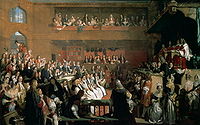Seven Bishops



The Seven Bishops of the Church of England were those imprisoned and tried for seditious libel over their opposition to the second Declaration of Indulgence issued by James II in 1688. They were found not guilty.
The Declaration granted broad religious freedom in England by suspending penal laws enforcing conformity to the Church of England and allowing persons to worship in their homes or chapels as they saw fit, and it ended the requirement of affirming religious oaths before gaining employment in government office.
The Declaration of Indulgence had originally been given out on April 4, 1687. The King republished it, with some new prefatory matter, on April 25, 1688. On May 4, the King and his Council ordered the Bishops that the Declaration should be read in all the (Anglican) churches - those of London on May 20, and outside London on the 27th and the two following Sundays. This was the only way, in those days, of making the document swiftly and generally known, which was James's straightforward object; the Anglican Clergy, however, felt it a challenge to themselves, for many of them were opposed to the toleration of Catholics and Nonconformists, as were very many of the population of England at that time.
Nine days passed with no objection; then, on May 13, at Lambeth Palace, Compton (the Bishop of London), Sancroft (Archbishop of Canterbury), Turner (Bishop of Ely), and White (Bishop of Peterborough), resolved to defy James's order. They summoned seven others; the four who actually came were Lake (Bishop of Chichester), Lloyd (St Asaph), Trelawny (Bristol), and Turner (Ely). It will be noticed that this (ignoring the three who did not come) makes a total of eight bishops, counting the Archbishop of Canterbury. Compton is not counted in the reckoning of the seven. These seven Bishops signed a Memorial requesting the King that they might be excused; they claimed that the King did not have the legal right to make exemptions from statutes (which was false).
On the night of the Friday, May 18 - not giving James much time - they presented the King with their petition, by way of an ultimatum. James was prepared to negotiate, and asked them to come back the next day, when he would be able to give a yes or a no answer. Before the hour appointed on that Saturday, the Memorial of the Bishops had been published in numerous copies and broadcast all over London.
The Council were not sure what to do, but summoned them to appear before them on Friday, June 8. The Bishops could have given their own recognizances for coming up for trial, and thereby avoided being imprisoned before their trial. Sancroft had urged this; even Compton agreed to it; but Sancroft broke his word. There was no legal course but to keep them in the Tower before their trial; within the Tower, however, they had complete freedom. But, in Hilaire Belloc's deliberately ironic words, "Compton had had the satisfaction of seeing a vast popular gathering acclaiming these fathers in God on the way to the horrid dungeon of a Tyrant."[1]
The trial took place at the Court of King's Bench on June 29, continuing into the next day, with Sir Thomas Powys the Attorney General prosecuting and John Powell as the presiding judge, and they were found not guilty. There was great rejoicing; those opposed to Toleration had gained their victory.
The Seven Bishops were:
Despite their petition and their trial, five of these bishops (all but Lloyd and Trelawny) remained loyal to James II after the Revolution of 1688 and were among the nine bishops who became non-jurors, refusing to swear an oath of allegiance to William and Mary, and losing their bishoprics as a result.
Notes[edit]
- ^ Belloc, Hilaire, "James the Second," Faber & Gwyer, 1928, p. 216. The section from "The Declaration of Indulgence had originally" to this quotation is paraphrased from this book.
External links[edit]
- Chapter VIII of Macaulay's History of England - the last third of this chapter describes the circumstances surrounding the Petition and Trial of the Seven Bishops
- Petition of the Seven Bishops
- Documents by and about the Nonjurors from Project Canterbury
- William Gibson, James II and the Trial of the Seven Bishops, (Palgrave Macmillan, 2009)
